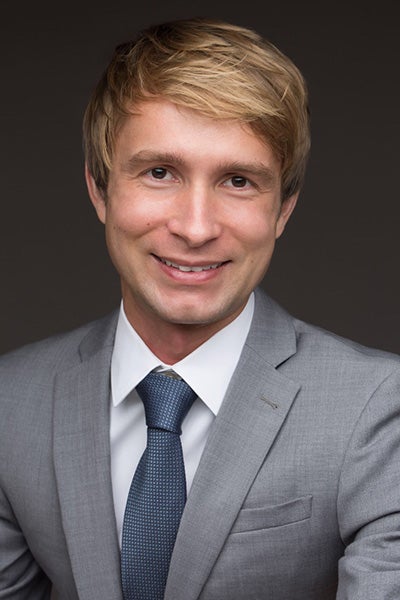Assistant Professor Mark Hartman was honored by his former university
A University of Rhode Island kinesiology professor’s dissertation on the origin of the sense of fatigue during physical exercise has been recognized by a prestigious award at his alma mater, Iowa State University.
Assistant Professor Mark Hartman, an alumnus of Iowa State’s doctoral program in kinesiology, has been awarded with the Graduate College’s Karas Award for Outstanding Dissertation. Each spring, the Graduate College awards the Karas Award to two students with superior dissertations in rotating disciplinary fields.
Hartman graduated with his doctorate in the summer of 2020. His dissertation, entitled “The neural basis of the sense of fatigue,” explored many types of fatigue, including post-exercise fatigue, fatigue related to illness, and chronic fatigue syndrome. Researchers have so far struggled to explain the neurological basis of fatigue, leaving many people who suffer from excessive fatigue without appropriate treatments.
“If you have severe debilitating fatigue, then we can study your brain, but we don’t know what the brain looked like prior to that, so that’s a limitation,” Hartman said. “We also can’t treat it, because we don’t know exactly what’s going on.”
Through his dissertation, Hartman studied fatigue by monitoring brain activity before, during and after exercise. Exercising, he explained, is currently one of the only ways to experimentally test fatigue, because researchers can only study illness-related fatigue after it has already occurred.
Thirty Iowa State students volunteered for the study. Each time they visited the laboratory, they exercised on a stationary bicycle for up to 20 minutes. In order to measure their brain activity, Hartman utilized a device that measured the activity of the prefrontal cortex, an outer layer of the brain, which includes the areas that regulate emotions, cognitive functions, and other executive processes. To measure deeper areas of the brain, he used the acoustic startle eyeblink response, since previous studies have shown that the speed of eyeblinks correlates with activity in deeper brain structures.
“Participants in the study had to wear what’s been described as a football helmet from space,” Hartman said. “There was an excessive number of sensors patched all over their face and head, and tubes coming out of their mouth, so it was quite difficult to figure out how to get everything on the person’s head and make sure that it was accurately recording. The development of the methods was probably one of the more difficult things I’ve ever done.”
Hartman’s dissertation was the first study that combined these specific methods to measure brain activity during exercise. As a result, researchers may be able to use his findings to develop treatments for fatigue.
“During exercise, imagine you’re about to max out, and you’re extremely fatigued. If you receive some brain stimulation in the frontal area, perhaps you can push yourself a little harder or feel a little better for a little longer,” he said. “Based on that, you could apply it to the next step of clinical cancer fatigue. If a patient is feeling fatigued on a particular day, what if we stimulated that region of the frontal cortex that we looked at? Maybe their symptoms of fatigue would be partially alleviated so they wouldn’t be debilitated that entire day.”
Hartman’s former professor at Iowa State nominated him for the Karas Award and was optimistic that he would receive it given the significance of the study.
“It would not be an exaggeration to say that Mark’s doctoral dissertation was the most significant step forward in the study of exertional physical fatigue to date,” kinesiology Professor Panteleimon Ekkekakis wrote in his nomination letter. “It introduced a new conceptual model, a new set of investigative techniques, and a potential avenue for intervention for the many individuals worldwide who face problems associated with exaggerated or unmanageable symptoms of exertional physical fatigue.”
Hartman began his faculty role at URI in the fall of 2020. In addition to his role in the Kinesiology department, he also serves as a member of URI’s interdisciplinary neuroscience program.
When he learned that he had been selected as a 2021 Karas Award winner, Hartman said he felt encouraged that the research he is doing could make a difference in people’s lives.
“As I pursue this research for my career, there is a potential that I can help people, and that we can alleviate fatigue, especially clinical fatigue,” he said. “And it’s going to be something that can continue to make a larger impact on society.”

